WHEN A MAN YOU LOVE
WAS ABUSED
WHEN A MAN YOU LOVE
WAS ABUSED
A Womans Guide to Helping Him
Overcome Childhood Sexual Molestation
CECIL MURPHEY

When a Man You Love Was Abused: A Womans Guide to Helping Him Overcome Childhood Sexual Molestation
2010, 2011 by Cecil Murphey
Published by Kregel Publications, a division of Kregel, Inc., P.O. Box 2607, Grand Rapids, MI 49501.
Use of this ebook is limited to the personal, non-commercial use of the purchaser only. This ebook may be printed in part or whole for the personal use of the purchaser or transferred to other reading devices or computers for the sole use of the purchaser. The purchaser may display parts of this ebook for non-commercial, educational purposes.
Except as permitted above, no part of this ebook may be reproduced, displayed, copied, translated, adapted, downloaded, broadcast, or republished in any form including, but not limited to, distribution or storage in a system for retrieval. No transmission, publication, or commercial exploitation of this ebook in part or in whole is permitted without the prior written permission of Kregel Publications. All such requests should be addressed to:
This ebook cannot be converted to other electronic formats, except for personal use, and in all cases copyright or other proprietary notices may not modified or obscured. This ebook is protected by the copyright laws of the United States and by international treaties.
All Scripture quotations, unless otherwise indicated, are from the Holy Bible, New Living Translation, copyright 1996, 2004. Used by permission of Tyndale House Publishers, Inc., Wheaton, Illinois 60189. All rights reserved.
Scripture quotations marked KJV are from the King James Version.
Scripture quotations marked NIV are from the HOLY BIBLE, NEW INTERNATIONAL VERSION. NIV. Copyright 1973, 1978, 1984 by International Bible Society. Used by permission of Zondervan. All rights reserved.
Scripture quotations marked NKJV are from the New King James Version. Copyright 1982 by Thomas Nelson, Inc. Used by permission. All rights reserved.
The author and publisher are not engaged in rendering medical or psychological services, and this book is not intended as a guide to diagnose or treat medical or psychological problems. If the reader requires medical, psychological, or other expert assistance, please seek the services of your own physician or certified counselor.
Contents
A Word About the Names in This Book
When I write nonfiction books I like to provide the full name of the individuals involved. I believe it adds integrity to the material and shows theyre not made-up accounts or composites. In this book, however, I cant do that. This material is much too sensitive and personal.
If I gave my name, one man said, my family might find out, and they wouldnt forgive me. His stepfather had been the perpetrator.
Others who talked to me gave no specific reason other than to say, Im not ready to tell this publicly or Id rather you dont use my name.
Out of respect for these individuals, Ive disguised their identity. If you read only a first name, its for one of three reasons:
- The person requested I not use his name.
- Several of the groups in which I participated are like AAand we use only our first names. I tell the story of a man named Red, for example, so called because thats the only name by which I knew him.
- I no longer have contact with the person and couldnt get permission.
How to Use This Book
Ive designed this book in two parts, and it doesnt matter which you read first.
Part 1 focuses on male sexual assault and its effects. This part is basically informative, and its purpose is to help you understand the problems that male abuse victims face.
Part 2 is the practical section. The purpose is to show youa woman in the life of a man who was molested as a childwhat you can do to help him.
M y deepest thanks
 To the men who, because of their experiences, helped me write this book, and many of whose names I cannot list here: You have been through the horrors of life and survived, and Im grateful youre able to talk about your pain.
To the men who, because of their experiences, helped me write this book, and many of whose names I cannot list here: You have been through the horrors of life and survived, and Im grateful youre able to talk about your pain.
 To Shirley, my wife, and David Morgan, my special friend: You two loved me enough to give me the courage to heal.
To Shirley, my wife, and David Morgan, my special friend: You two loved me enough to give me the courage to heal.
 To Deidre Knight, my agent and encourager; and my assistant, Twila Belk, who understood.
To Deidre Knight, my agent and encourager; and my assistant, Twila Belk, who understood.
 To my editor, Steve Barclift, who believed in this book and courageously took it to his publishing committee.
To my editor, Steve Barclift, who believed in this book and courageously took it to his publishing committee.
H e was molestedor at least you suspect he was. That means he was victimized by someone older and more powerful than he was. The man you care for might be your boyfriend, husband, brother, father, or son. He is someone you care about deeply, and because he hurts, you hurt.
He hurts because he was victimized in childhood. Many therapists dont like the word victim or victimized and prefer to speak of survivors. They also dont like the word abused and usually opt for assaulted. The media tend to use the word molested. In this book, I use the terms interchangeably.
Regardless of the word used, something happened to himsomething terrible and frighteningthat will affect him for the rest of his life. Something happened to him that affects your life as well.
How Can You Help?
Because you care about him, you have also been victimized. Because of your love for him, youve been hurt, and you may have suffered for a long time. But the man you care for didnt hurt you intentionally. He was trying to cope with his problem.
Perhaps years passed before you knew about his childhood pain. During that time, you may have sensed something was wrong. Statistics indicate that men tend to reveal themselves more readily to a woman, usually a wife or girlfriend.
But even if you knew about his experience, how could you have grasped how it would impact your relationship? Because he battled the problem that he couldnt talk about, he did it privately and sometimes not too well. How could you not feel rejected or hurt when he shut you out?
Even if he faced his abuse, he may have excused the perpetrator. Although the man in your life was the victim, he may have felt guilty for the abuse. His undeserved guilt is real. And he hurts.
Because he hurts, you hurt too.
Thats part of your victimization. His reactions, attitudes, and behavior caused you to assume blame and guilt, and youve asked yourself, How did I fail? You may not have voiced those words, but you felt you were the flawed person in the relationship.
If this describes you, you may already have gone through a lengthy period of wondering what was wrong with you. You tormented yourself with questions:
 Why does he shut me out?
Why does he shut me out?
 Why cant I help him?
Why cant I help him?
 Why cant I take away his pain?
Why cant I take away his pain?
 Why wont he talk to me or allow me into his private world?
Why wont he talk to me or allow me into his private world?

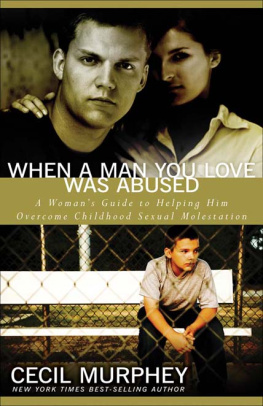
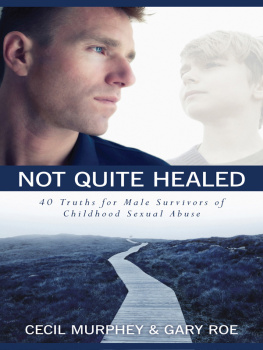
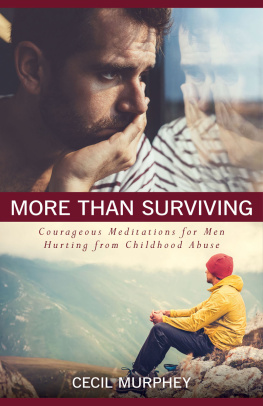

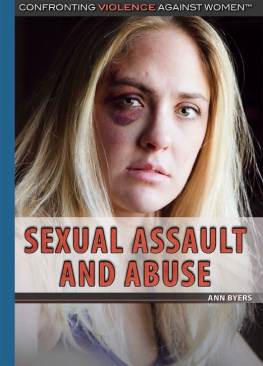
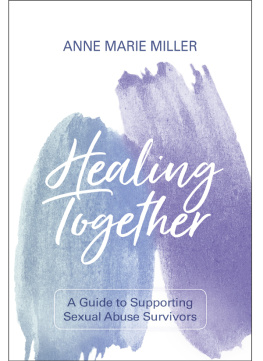
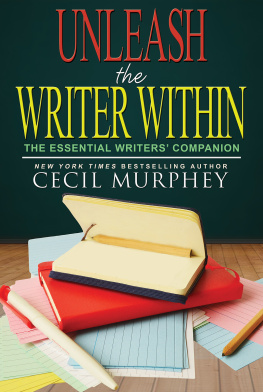
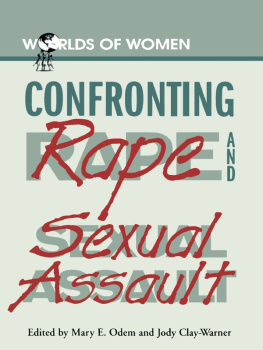
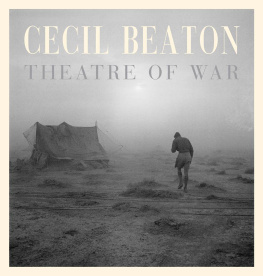
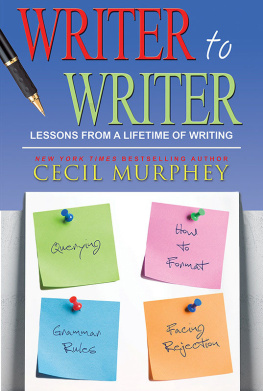
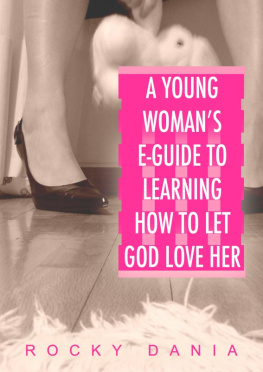

 To the men who, because of their experiences, helped me write this book, and many of whose names I cannot list here: You have been through the horrors of life and survived, and Im grateful youre able to talk about your pain.
To the men who, because of their experiences, helped me write this book, and many of whose names I cannot list here: You have been through the horrors of life and survived, and Im grateful youre able to talk about your pain.